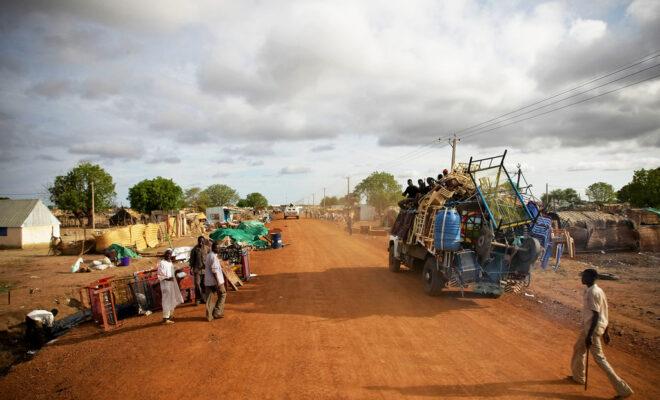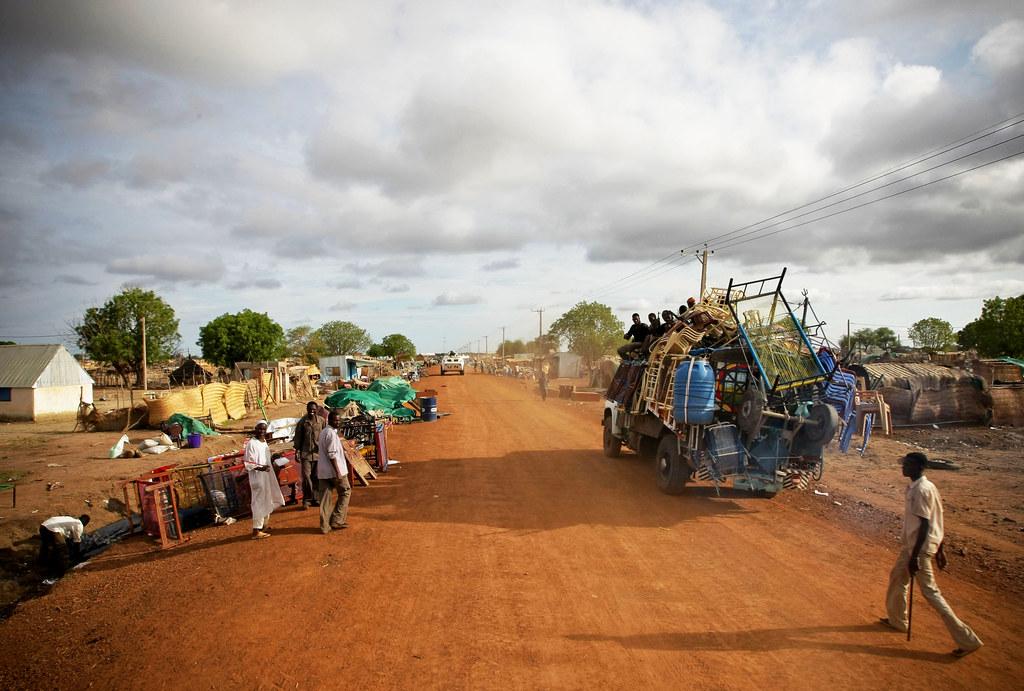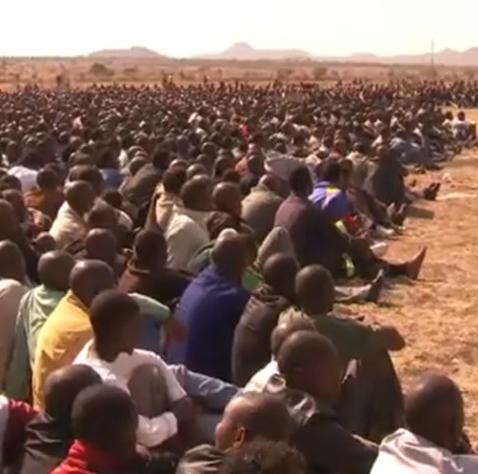Abyei: Sudan and South Sudan’s new chance to solve old disputes

The disputed border area of Abyei has been deadlocked for years. A new approach based on sharing rather than winner-takes-all is needed.

The area of Abyei, on the border between Sudan and South Sudan, has been disputed since 2011. Credit: UN Photo/Stuart Price.
In the excitement around Sudan’s evolving political order and the concerns around South Sudan’s challenges, less attention has been paid to some long-standing contentious issues that have the potential to create new havoc. One of those issues is the disputed area between Sudan and South Sudan known as Abyei. The opportunity presented by the establishment of a new civilian government in Sudan following the fall of Omar al-Bashir offers fresh hope that Abyei can be freshly addressed.
Lying on the border between the two countries, Abyei has been a disputed area since South Sudan become independent in 2011. In the run-up to the independence referendum, Khartoum and Juba argued fiercely over whether the territory ought to belong to the north or south. The outcome was initially seen as particularly significant due to the presence of large oil reserves in the region, though after the Permanent Court of Arbitration in The Hague ruled that most oil fields fell outside Abyei, the focus shifted to the area’s economic and sociopolitical importance.
Eventually, the two parties agreed that Abyei’s status would be decided by a separate referendum in January 2011 on the same date as the vote on South Sudan’s independence. The poll was delayed, however, due to disagreements over who would be eligible to vote. South Sudan argued that only the Ngok Dinka, who permanently reside in Abyei, should be allowed to vote. Sudan insisted that the Misseriya, a pastoral Arab group that lives in the area seasonally, should also be eligible.
This point is crucial. According to a 2008 estimate, the population of West Kordofan state, the homeland of the Misseriya, was 1.3 million. The population of the Ngok Dinka was just 200,000. This means that if the Misseriya voted in a referendum, Abyei would almost certainly become part of Sudan, given that West Kordofan is a state in Sudan. If only the Ngok Dinka were eligible, the result would go the other way. In fact, in a unilateral and unsanctioned vote held in October 2013, the Ngok Dinka voted almost unanimously to join South Sudan.
Amidst this ongoing disagreement, the status of Abyei has long been deadlocked. To break it, Sudan has proposed establishing a joint administration in the area, but South Sudan insists that a referendum is the only solution.
Replacing winner-takes-all with compromise
As things stand, Sudan and South Sudan each control parts of the area, but the only armed force allowed in Abyei is the UN Security Force for Abyei (UNISFA). This almost exclusively Ethiopian peacekeeping mission has helped prevent the resumption of a full-scale border war, though it has not been able to stop violence completely. There have been occasional deadly assaults on civilians and peacekeepers. Most recently in July 2019, unknown assailants attacked UNISFA peacekeepers, killing one soldier and five civilians.
In order to move forward, the issue of Abyei’s future requires internationally supported mediation. Some have suggested that such a mediation should support the establishment of two separate administrations for the Ngok Dinka and Misseriya respectively, but such a temporary measure would only postpone rather than fix the problem.
The best way to truly resolve the issue might be for Sudan and South Sudan return to the table in order to compromise. They could agree that regardless of which country Abyei eventually joins, its resources – such as any minerals or oil – will be shared according to a formula to be negotiated. This would cover both goods that have already been discovered and those that might be uncovered in the future.
The two parties could also agree that whether Abyei becomes part of Sudan or South Sudan, the Misseriya and Ngok Dinka will continue to share land as they have historically for countless generations. This resolution would allow for the continued integration of the two groups’ livelihoods, an issue of great importance to these local communities but often of little importance to officials in Khartoum and Juba. On this front, Misseriya and Ngok Dinka elders can negotiate compromises regarding resource-sharing. Until recently, traditional agreements allowed both groups to use the land, water points and cross-border resources, as well as helping to maintain peace.
This kind of compromise might allow for a stable solution to the Abyei question. Along the border areas of Sudan and South Sudan, economic motives and access to resources are the main drivers of conflict and disputes. By separating out these factors and including representatives from Juba, Khartoum, the Ngok Dinka, and the Misseriya in talks, a new resolution based on sharing – rather than forcing a winner-takes-all contest – is possible.
The new political dispensation in Sudan offers both sides a fresh opportunity to discuss Abyei as part of larger efforts to end all conflicts between the two neighbours and prevent future escalations along the border. As well as resolving much uncertainty, this would allow for greater economic cooperation and its associated benefits for both sides.
Building on the recent visit of Sudan’s new Prime Minister Abdalla Hamdok to South Sudan, the two governments should aim to build mutually-beneficial economic relations and support peace initiatives in both countries. Resolving the dispute over Abyei could be a test case for a new cooperative and economic-based approach to relations between these two countries, whose history of volatility requires a new way forward.
أبيي: فرصة السودان وجنوب السودان الجديدة السانحة لحل النزاعات القديمة
لطالما ظل الوضع في منطقة أبيي الحدودية المتنازع عليها في حالة جمود منذ سنوات. ولا بد من إتباع نهج جديد يقوم على المشاركة بدلاً من مبدأ أن الفائز يظفر بكل شيء.
ظلت منطقة أبيي، الواقعة على الحدود بين السودان وجنوب السودان، محل نزاع منذ عام 2011. مصدر الصورة: الأمم المتحدة/ستيوارت برايس.
في ظل الحالة المثيرة التي يشهدها الوضع المتطور للنظام السياسي في السودان والمخاوف المتعلقة بالتحديات التي تواجه جنوب السودان، تم إيلاء اهتمام أقل ببعض القضايا المستمرة التي طال أمدها والتي من المحتمل أن تخلق حالة جديدة من الفوضى. ومن بين تلك القضايا ما يتعلق بالمنطقة المتنازع عليها بين السودان وجنوب السودان والمعروفة باسم أبيي. وتمنح الفرصة السانحة في ظل تشكيل حكومة مدنية جديدة في السودان عقب إقصاء عمر البشير عن الحكم أملاً جديدًا لإمكانية التعامل مع مشكلة أبيي بطريقة جديدة.
لقد شكّلت منطقة أبيي الواقعة على الحدود بين البلدين منطقة تنازع منذ استقلال جنوب السودان في عام 2011. وخلال الفترة التي سبقت الاستفتاء على الاستقلال، كانت هناك حالة من الشد والجذب بين كلٍ من الخرطوم وجوبا حول تبعية هذا الإقليم، إلى الشمال أم الجنوب. وقد اعتُبرت النتيجة في البداية ذات أهمية خاصة بسبب وجود احتياطيات نفطية كبيرة في المنطقة، وعلى الرغم من أن محكمة التحكيم الدائمة في لاهاي قد قضت بأن معظم حقول النفط تقع خارج أبيي، إلا أنّ التركيز قد تحول صوب الأهمية الاقتصادية والاجتماعية السياسية للمنطقة.
وفي نهاية المطاف، اتفق الطرفان على أن يتم تحديد وضع أبيي بإجراء استفتاء منفصل في يناير 2011 في نفس تاريخ التصويت على استقلال جنوب السودان. إلاّ أنّ هذا الاقتراع قد أُجّل بسبب خلافات حول ماهية الأشخاص المؤهلين للتصويت. وقد أشار جنوب السودان إلى أن أبناء قبيلة الدينكا، المقيمين بصفة دائمة في أبيي، هم فقط من يحق لهم التصويت. في حين أصر السودان على أن تكون المسيرية، وهي قبيلة عربية رعوية تعيش في المنطقة بصفة موسمية، مؤهلة هي الأخرى للتصويت.
هذه النقطة حاسمة؛ فوفقًا لتقديرات عام 2008، بلغ عدد سكان ولاية غرب كردفان، مسقط رأس المسيرية، 1.3 مليون نسمة. في حين لم يتجاوز تعداد قبيلة الدينكا 200,000 نسمة. وهذا يعني أنه في حالة مشاركة قبيلة المسيرية في الاستفتاء، فمن المؤكد أن أبيي ستصبح جزءًا من السودان، بالنظر إلى أن غرب كردفان تمثل إحدى ولايات السودان. أما في حال مشاركة قبيلة الدينكا فقط، فستأتي النتيجة في الاتجاه المعاكس. وفي واقع الأمر، فقد صوتت قبيلة الدينكا بالإجماع تقريبًا عبر تصويت أحادي الجانب وغير مصادق عليه أجري في أكتوبر 2013 لصالح الانضمام إلى جنوب السودان.
وفي خضم هذا الخلاف المستمر، سادت منطقة أبيي حالة من الجمود منذ فترة طويلة. ولكسر هذا الجمود، اقترح السودان إنشاء إدارة مشتركة في المنطقة، إلا أن جنوب السودان يصرّ على أن الاستفتاء هو الحل الوحيد.
الوصول إلى تسوية بدلاً من تطبيق مبدأ أن الفائز يظفر بكل شيء
كما هو الوضع الراهن، يسيطر كلٌ من السودان وجنوب السودان على أجزاء من المنطقة، إلا أن القوة المسلحة الوحيدة المسموح بها في أبيي هي قوة الأمم المتحدة الأمنية المؤقتة لأبيي. وقد ساعدت مهمة حفظ السلام الإثيوبية الحصرية تقريبًا هذه في الحيلولة دون استئناف الحرب الحدودية الشاملة، رغم أنها لم تكن لديها القدرة على وقف العنف بصورة كلية؛ حيث يتعرض المدنيون وأفراد قوات حفظ السلام إلى هجمات عرضية تؤدي إلى مقتل البعض. وفي الآونة الأخيرة في شهر يوليو من عام 2019، هاجم مسلحون مجهولون قوة الأمم المتحدة الأمنية المؤقتة لأبيي، مما أسفر عن مقتل جندي وخمسة مدنيين.
وللمضي قدماً في هذا الأمر، تتطلب قضية مستقبل أبيي وساطة مدعومة دولياً. وقد أشار البعض إلى ضرورة أن تدعم هذه الوساطة إقامة منطقتين إداريتين منفصلتين لكل من قبيلتي الدينكا والمسيرية على التوالي، إلا أن هذا الإجراء المؤقت سوف يعمل على إرجاء المشكلة بدلاً من الوصول إلى حل.
قد تكون أفضل السبل لحل هذه المشكلة في واقع الأمر هي عودة السودان وجنوب السودان إلى طاولة المفاوضات من أجل التوصّل إلى تسوية؛ إذ يمكنهما الاتفاق على أنه بغض النظر عن البلد الذي ستنضم إليه أبيي في نهاية المطاف، فسيتم تقاسم مواردها – مثل المعادن أو النفط – وفقًا لمعادلة يتم التفاوض بشأنها. وسيتضمن ذلك كلاً من السلع التي تم اكتشافها بالفعل وتلك التي قد يتم الكشف عنها في المستقبل.
يمكن أن يتفق الطرفان أيضًا على أنه إذا أصبحت أبيي جزءًا من السودان أو جنوب السودان، فإن قبيلتي المسيرية والدينكا سيتقاسمان الأرض كما كان الحال تاريخياً على مدى أجيال عديدة. ومن شأن هذا القرار أن يسمح باستمرار تكامل سبل العيش لكلتا القبيلتين، وهي مسألة ذات أهمية كبيرة لهذه المجتمعات المحلية إلا أنها في كثير من الأحيان لا تهم المسؤولين في الخرطوم وجوبا. وفيما يتعلق بهذا الجانب، يمكن لشيوخ قبيلتي المسيرية والدينكا التفاوض بشأن الوصول إلى تسوية حول تقاسم الموارد. وحتى وقت قريب، سمحت الاتفاقات التقليدية لكلتا القبيلتين باستخدام الأرض ونقاط المياه والموارد عبر الحدود، فضلاً عن المساعدة في الحفاظ على السلام.
قد يسمح هذا النوع من التسوية بالتوصّل إلى حل دائم لقضية أبيي. وتمثّل الدوافع الاقتصادية والوصول إلى الموارد على طول المناطق الحدودية للسودان وجنوب السودان المحفّزات الرئيسية للنزاعات والخلافات. فمن خلال إقصاء هذه العوامل، وحضور ممثلين عن جوبا والخرطوم وقبيلتي الدينكا والمسيرية في المحادثات، قد يتم التوصل إلى قرار جديد قائم على المشاركة – بدلاً من فرض مبدأ ظفر الفائز بكل شيء.
هذا ويوفر النظام السياسي الجديد في السودان للجانبين فرصة جديدة لمناقشة موقف أبيي كجزء من جهود أكبر ترمي لإنهاء جميع النزاعات بين الجارتين والحد من التصعيد في المستقبل على طول الحدود. وبالإضافة إلى التخلص من حالة عدم اليقين، فإن هذا الأمر سوف يتيح مزيدًا من التعاون الاقتصادي والفوائد المرتبطة به لكلا الجانبين.
تجدر الإشارة إلى أنّه بناءً على الزيارة الأخيرة لرئيس الوزراء السوداني الجديد عبد الله حمدوك إلى جنوب السودان، يتعين على الحكومتين استهداف بناء علاقات اقتصادية ذات منفعة متبادلة ودعم مبادرات السلام في كلتا البلدين. وقد يكون حل النزاع حول أبيي بمثابة اختبار لإتباع نهج تعاوني واقتصادي جديد للعلاقات بين البلدين، حيث إن تاريخ التقلبات بينهما يتطلب طريقًا جديدًا للمضي قدمًا.






A timely and useful reminder of the current impasse over the disputed Abyei enclave. But the concept of sharing the area not only legitamises the northern landgrab and overturns the provisions of the 2005 Comprehensive Peace Agreement and the findings of the Abyei Boundary Commission, it also precludes the chance of the Ngok Dinkas being able to join their kinsmen in post-independence South Sudan.
The idea that the two parties are equally intransigent and responsible for the deadlock is patently incorrect. Starting from that faulty premise renders the idea of a new international mediation that would emphasize shared instead of a winner take all outcome terribly wanting.
The Abyei stalemate is the result of the ousted regime of Omer el-Bashir refusing to comply with its commitments under the CPA and obstructing the binding ruling of the Permanent Court of Arbitration which settled the boundaries and should have thus facilitate the conduct of the referendum in the area. The regime unreasonably demanded that the Misseriya who are not permanent residents vote, or else the existing agreements and rulings be set aside and the area partitioned. What is proposed in this article basically countenances and rewards this blatant land grab and blackmail. We hope the new civilian-led administration in Khartoum will correct tbis anomalous situation and negotiate in good faith to allow a credible and transparent referendum by the permanent residents of Abyei. There is a fair proposal on the table by the mediation panel led by former South African President Thabo Mbekil and endorsed by the AU Peace and Security Council to resolve the matter. We should all push the parties to adopt it and implement it.
Abyei is not the only border area under dispute by Sudan and South Sudan, it is just the only one specifically covered by the CPA. There needs to be a more comprehensive agreement between Khartoum and Juba about the sharing of border resources – not just between the two governments, but recognizing the rights of the border peoples. A resolution to the Abyei issue might provide a model that could be adapted to other parts of the border.
As being not only strategically placed and naturally blessed turned curse town called Abye is used, being used and may continued to be used as negotiating tool by elites, who may wish to pursue their social-political,economical etc objectives.
The two eye and restorative approaches of compromises and integrated efforts of national- regional to “let” the people of Abye make once and for all and un-regretable decision on where, how and which country (ies) to belong to is cardinal issues to be addressed. The oil depletes, but the dispute continues, meaning that the root cause of the border dispute is not only oil reserve, but fight over craddle-ancestral lands.
The Abye people have been,are and will continue to stay together, intermarriage,have common social cuktural ideology for endless generations. Round Table,compromises, best rigourous, robust means can help resolve the menace without returning to full-scale violent border disbute of Abye.
Thanks Many.
Hope Sudan can be one country again since whom made the problem is no longer exists so why not be one brother again. Why we are making more difficulty again who will loses we are both suffering so we can solve out with confederate do you agree with me
Why not to be one country sharing all we have and respect the former borders for greater Sudan . Why we want to cut the culture we brought up at and as one nation try to develop the land we have gotten and learn to match our aims and neglect the bad habits such as selfishness, hate, to do what other countries want us to be and fight for nothing what we have gained from 2011 till now just compare losses and gains and weight which of them is right for us all. I hope you agree with me.
chloroquinolone https://chloroquineorigin.com/# hydroxychlor 200 mg
cialis dosage cialis coupon